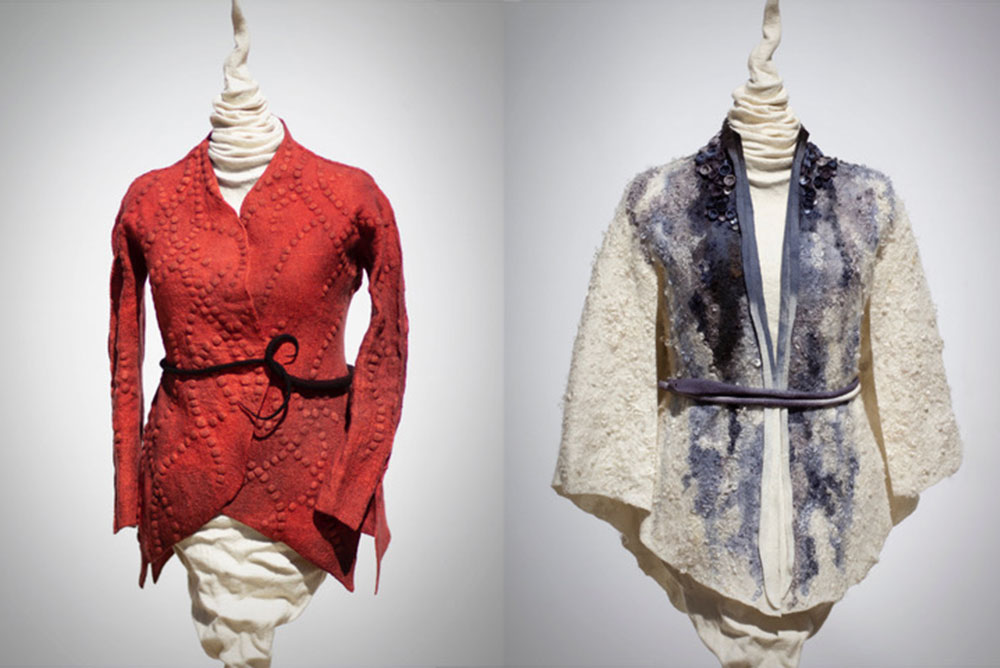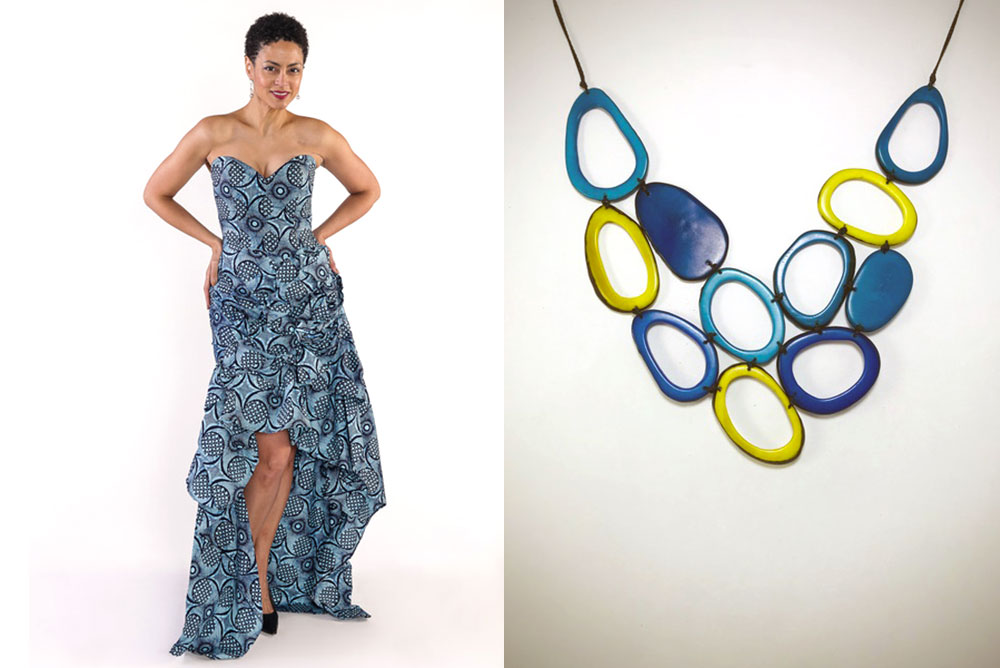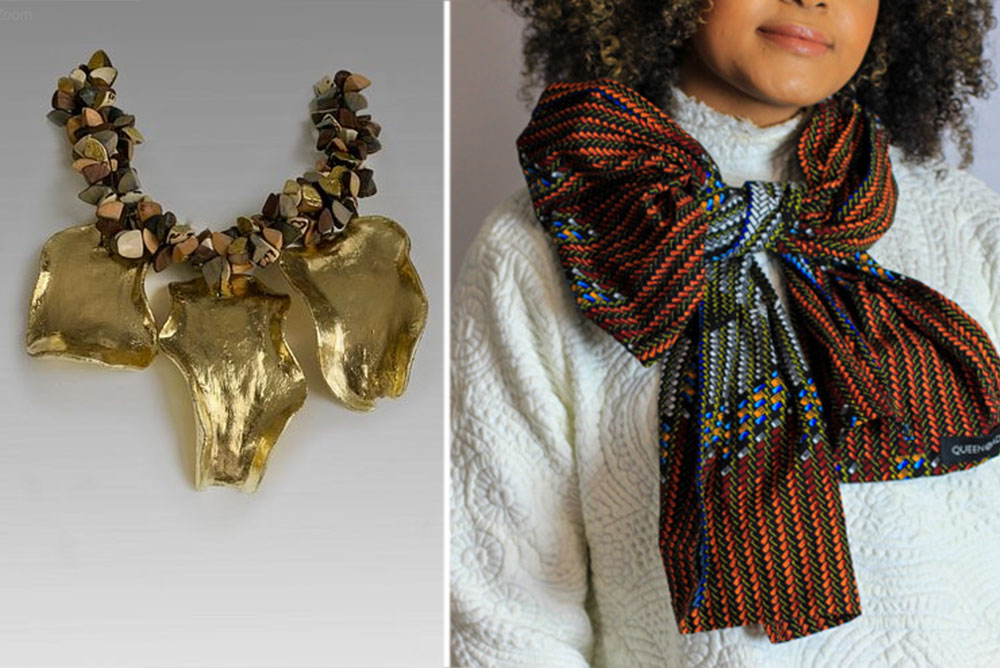By Janet Kelly
THE SHOW must go on. After all, it wouldn’t be spring without a Smithsonian Craft Show. Starting this Saturday, April 24—at 9am and continuing through Saturday, May 1 at 11:55pm—that seasonal tradition will continue. Craft Optimism, an online marketplace, will feature handcrafted American goods (wearables, jewelry, accessories and home decor) from 100 artists responding to the challenge of climate change.
Thanks to the here-today, gone-tomorrow trends of fast fashion, the fashion industry has become one of the planet’s worst polluters. The pandemic, though, has issued a wakeup call, changing our thinking to buying fewer, but more well-made clothes and cutting down on waste. Because fashion is one of our focuses here at MyLittleBird, we’re highlighting three women artists—two who create wearable art and one who designs jewelry—who are masters of their craft and represent the best in “slow” fashion.
Using felting techniques, Salt Lake City-based Jeanne Akita creates “wearable fiber art” that spans the spectrum from everyday outerwear to the avant-garde in her home studio, called Illusion Lab. She takes natural fibers from a wide range of plants and animals— wool from sheep or alpacas, for example, or recycled natural fabrics, such as sari silk—adds a small amount of soapy water, then hand massages the fibers until they become a cohesive, compact fabric. Akita forms her seamless, reversible clothing as soft 3D sculptures, which she then hand-dyes and paints and attaches fasteners and adds decoration.

LEFT: Artist Jeanne Akita created her “Martian fire ocean” jacket ($1,450) using the ancient textile-making process of felting with hand-selected, sustainable natural fibers as well as recycled natural fabrics. One side has a suede-like texture; the other a silk. “Her goal is to create unique high-fashion wearable art that is timeless, has a minimal environmental impact and a long life cycle unlike fast fashion.”
RIGHT: Inspired by the latest NASA planetary photo series, Akita created this unique yet functional art piece with her hand felting technique. The white and blue “Uranus tail” bold, unusual cape ($1,850) also features “eco fur,” a faux fur material made with lamb’s fleece.
When Queen Allotey-Pappoe talks about sustainability for her Lowell, Massachusetts-based Queen Adeline brand, she means it. She is committed to reducing waste, such as not using zippers if they aren’t needed and using each piece of fabric to its fullest capacity. The designer creates wearable art that celebrates the rich pattern and color of African textiles.
Growing up in Colombia, Lula Castillo became interested in working with local materials from the Amazon Rain Forest, including Tagua and Bombona nuts (palm tree nuts), jacaranda seed pods and acai seeds. With a degree in industrial design along with a passion for jewelry and wearable objects, she learned how to work the materials into an eco-friendly collection of necklaces, bracelets, rings and earrings that are colorful, fun and lightweight wearable pieces of art.

LEFT: Be ready when parties begin again. This Queen Adeline signature gown ($1,800) from designer Queen Allotey-Pappoe is made from a wax cotton print fabric and other biodegradable fibers sourced from Ghana. Each of her pieces is a one-of-a-kind, handmade and functional statement piece. Gowns are made with a zero-waste approach; any scraps from projects are redesigned into accessories.
RIGHT: Lula Castillo’s asymmetrically designed Hierba necklace ($98) is handmade with Tagua nut rings and slices in royal blue, turquoise and lime green, providing a pop of color to accent your neutrals. Despite the visual volume, the jewelry is lightweight, and you can adjust the length.

LEFT: Lula Castillo’s Gold Chibcha Necklace ($450) is made of three seed pods covered in 24-karat Italian gold leaf. Bombona nuts cut in quarters and dyed in white, caramel, gray and brown (some of them also have gold leaf on the sides) form the top of the necklace, which Castillo advises looks best when worn as a choker.
RIGHT: Bet no one else on your block will have as vividly printed neck scarf /head wrap ($60) as this one from Queen Allotey-Pappoe. Made from an all-cotton African wax print fabric, you can wear it year ’round.
Ready to purchase an item or three? First, go to Bidsquare. You’ll need to use a credit card for verification (a $1 charge will be submitted and refunded immediately) and then you’ll be able to browse all the shops in Craft Optimism. To shop, use the one-click registration button at the top of each artist’s shop; to purchase, press BUY NOW on the item(s) of your choice, and you will receive an invoice from the artist by email.
Sponsored by the Smithsonian Women’s Committee (SWC) and Honoring the Future, a non-profit organization based in Philadelphia, the. Proceeds support grants to the Smithsonian for innovative education, outreach and research projects.
